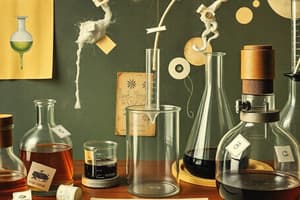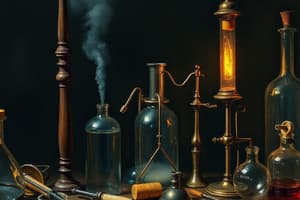Podcast
Questions and Answers
What is one way that different branches of science can work together?
What is one way that different branches of science can work together?
- Branches of science operate independently without collaboration.
- A zoologist can use chemical knowledge to study animal species. (correct)
- A zoologist may conduct experiments in a laboratory.
- A geologist only studies soil without any external input.
What role does a congress play in the scientific community?
What role does a congress play in the scientific community?
- Congresses solely focus on awarding scientific prizes.
- Congresses are platforms for showcasing only completed research.
- Congresses are only attended by scientists from the same country.
- Congresses facilitate dialogue and debate among researchers. (correct)
Which of the following describes a potential benefit of science magazines?
Which of the following describes a potential benefit of science magazines?
- Magazines serve as a platform solely for opinions and commentary.
- Magazines help raise awareness about current research projects. (correct)
- Magazines focus exclusively on academic research with no public interest.
- Magazines provide only historical information about science.
Who is credited with the creation of the Nobel Prize?
Who is credited with the creation of the Nobel Prize?
In what area did Ana Roqué de Duprey significantly contribute?
In what area did Ana Roqué de Duprey significantly contribute?
What is one notable honor that scientists in Puerto Rico can receive?
What is one notable honor that scientists in Puerto Rico can receive?
Which branch of science would primarily investigate animal species in their natural habitats?
Which branch of science would primarily investigate animal species in their natural habitats?
What type of environments would a geologist examine?
What type of environments would a geologist examine?
What is the primary purpose of scientific research?
What is the primary purpose of scientific research?
Which tool is used to make small objects appear larger?
Which tool is used to make small objects appear larger?
Where might scientific research take place?
Where might scientific research take place?
What is the role of a balance scale in scientific investigations?
What is the role of a balance scale in scientific investigations?
Which organization is dedicated to studying outer space?
Which organization is dedicated to studying outer space?
What significant discovery is attributed to the Arecibo Observatory?
What significant discovery is attributed to the Arecibo Observatory?
Which of the following is NOT a tool used by scientists?
Which of the following is NOT a tool used by scientists?
What happened to the Arecibo Radio telescope in 2020?
What happened to the Arecibo Radio telescope in 2020?
Flashcards are hidden until you start studying
Study Notes
Chapter 2- Doing Science
- Scientists are curious and use scientific instruments to investigate the world around them.
- Microscope: A tool used to magnify small objects.
- Hand lens: A magnifying glass used to enlarge objects.
- Balance scale: A tool used to measure mass and weight.
- Beaker: A container used to hold and measure liquids.
- Scientific research can take place in various locations, including laboratories, classrooms, the ocean, and outer space.
- Pharmacies: Conduct research related to medicine development and distribution.
- Centers for Disease Control and Prevention (CDC): Study and prevent diseases, working to improve public health.
- NASA: Focuses on space exploration, studying planets, stars, and the universe.
- Arecibo Observatory: An important research facility built in the 1960s that played a key role in studying outer space.
- What happened to the Arecibo Radio telescope in 2020? The telescope collapsed due to structural issues.
- Different branches of science complement each other, such as zoology, chemistry, and geology.
- A scientific community is a group of scientists who collaborate, share knowledge, and work together on research projects.
- Congresses and Magazines: Platforms and publications for scientists to share findings, present research, and stay up-to-date on scientific advancements.
- Nature and Science are considered to be essential in the world of science.
- The Nobel Prize in science:
- Created by Alfred Nobel, a renowned Swedish inventor best known for creating dynamite.
- Established in 1901 and awarded annually in different scientific categories.
- Awarded by the Nobel Foundation in Sweden.
- John Bardeen won the Nobel Prize in Physics twice, in 1956 and 1972.
- Science in Puerto Rico: Many research institutions and scientists in Puerto Rico contribute to scientific advancements, with recognition given through the Agustín Stahl Prize.
- Ana Roqué de Duprey: A prominent Puerto Rican educator, writer, and scientist, known for her contributions to women's suffrage and her study of natural history.
Studying That Suits You
Use AI to generate personalized quizzes and flashcards to suit your learning preferences.




